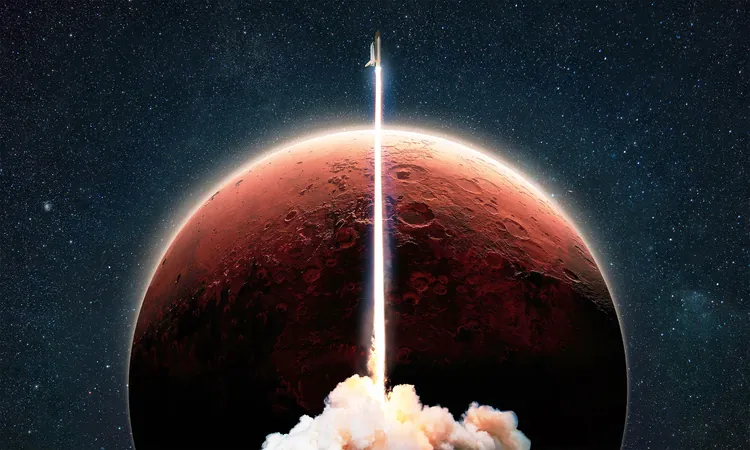
Shocking Discovery: Astronauts' Kidneys at Risk for Mars Missions—What You Need to Know!
2025-03-31
Author: Jia
Space exploration is entering a new frontier as humanity prepares for long-term missions to destinations like Mars.
However, new research reveals that astronauts may face dire consequences for one vital organ—the kidneys—during these extensive journeys.
In a groundbreaking study led by Dr. Keith Siew from the London Tubular Centre at University College London, researchers have uncovered alarming truths about the kidney's vulnerability in space.
Previous studies suggested potential health risks for astronauts since the dawn of space travel, but this detailed analysis provides concrete insights into the traumatic effects of space conditions on these essential organs.
The Kidney Conundrum in Space Travel
This extensive study, involving over 40 research institutions worldwide, synthesized data from 20 distinct research cohorts and over 40 missions to the International Space Station.
It also included rigorous simulations, analyzing the toll that microgravity and cosmic radiation take on the kidneys over extended periods.
The findings announced an unsettling reality: the structure and functional integrity of kidneys are compromised during spaceflight, chiefly due to exposure to galactic radiation, which could lead to chronic damage that threatens the viability of long-duration missions.
Galactic Challenges: Radiation and Microgravity
While astronauts aboard the International Space Station benefit from some protection offered by Earth’s magnetic field, missions to Mars will fully expose them to Galactic Cosmic Radiation (GCR).
So far, only 24 astronauts have briefly encountered this radiation during lunar missions, but no one has yet tested the long-term repercussions of months to years spent beyond Earth's protective barriers.
The latest research revealed that even short exposure to microgravity can lead to significant changes in kidney tubules responsible for managing minerals and fluids, resulting in an increased risk of kidney stones.
This challenges previous notions that attributed stone formation predominantly to bone density loss during space travel.
The Countdown to Mars: Is it Worth the Risk?
As missions expand in duration and distance, the looming threat of radiation damage becomes more pronounced.
Recent simulations showed that mice exposed to radiation comparable to a mission lasting 2.5 years exhibited irreversible kidney damage.
This suggests that astronauts might face similar fates unless countermeasures are developed.
“When it comes to long missions, we cannot ignore kidney health,” warns Dr. Siew. “If we don’t find solutions, astronauts may need dialysis either en route or after arriving on Martian soil.”
Professionals in renal medicine have long recognized the significance of safeguarding not just bones and cardiovascular health, but now, kidneys are at the forefront of space health research.
Future Prospects and Earthly Benefits
The implications of this research extend beyond space exploration.
Innovations developed to protect astronauts' kidneys could one day translate into treatments for patients on Earth.
For instance, understanding how to enhance kidney resilience could revolutionize cancer treatments, allowing stronger doses of radiotherapy without damaging these vital organs.
The multi-national collaboration underscores a growing momentum to address kidney health in the context of space travel, signaling that solutions are not just fantastical dreams; they could be groundbreaking advancements benefiting both astronauts and patients suffering on Earth.
What’s Next for Astrobiology?
While this study provides vital insights into kidney changes during two-and-a-half-year simulations, researchers emphasize that identifying these risks is merely the first step.
As humanity sets its sights on Mars, experts are urging urgent attention to how we can mitigate the combined effects of microgravity and cosmic radiation.
With significant implications for health and mission success, monitoring and protecting kidney function is more crucial than ever.
As we venture further into the cosmos, the state of our kidneys could very well dictate the future of human space exploration.
Stay tuned as the latest research is published, and prepare to be astonished by the intricate challenges of achieving interplanetary travel.
Will we find solutions that protect not only our bodies but our ambitions to explore the unknown?
For more engaging content and updates on space exploration, be sure to subscribe to our newsletter!





 Brasil (PT)
Brasil (PT)
 Canada (EN)
Canada (EN)
 Chile (ES)
Chile (ES)
 Česko (CS)
Česko (CS)
 대한민국 (KO)
대한민국 (KO)
 España (ES)
España (ES)
 France (FR)
France (FR)
 Hong Kong (EN)
Hong Kong (EN)
 Italia (IT)
Italia (IT)
 日本 (JA)
日本 (JA)
 Magyarország (HU)
Magyarország (HU)
 Norge (NO)
Norge (NO)
 Polska (PL)
Polska (PL)
 Schweiz (DE)
Schweiz (DE)
 Singapore (EN)
Singapore (EN)
 Sverige (SV)
Sverige (SV)
 Suomi (FI)
Suomi (FI)
 Türkiye (TR)
Türkiye (TR)
 الإمارات العربية المتحدة (AR)
الإمارات العربية المتحدة (AR)